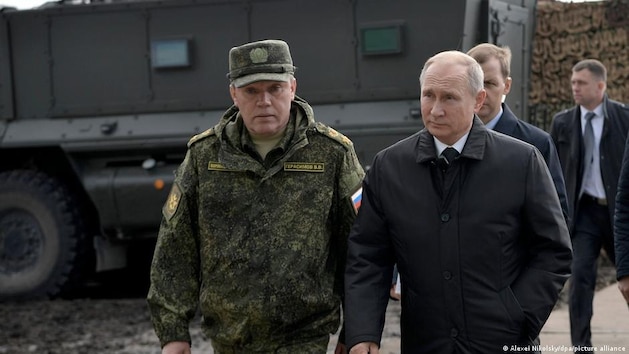The war in Ukraine is still in full swing. But the world community is already working on ways to hold Russia’s President Vladimir Putin accountable for his war of aggression. There are ways to bring him to court – at least in theory.
The war in Ukraine is raging relentlessly, with no end in sight. But the question already arises as to whether a man like Russia’s President Vladimir Putin, who ordered the invasion of the neighboring country, can be tried in an international court for his actions. In fact, Putin is already under investigation. Foreign Minister Annalena Baerbock (Greens) is calling for a special tribunal before which Putin could be indicted. But which prosecution options are realistic?
Christoph Safferling is Professor of International Criminal Law at the Friedrich Alexander University in Erlangen. He explains where Putin could theoretically be indicted.
The International Criminal Court (ICC), based in The Hague in the Netherlands, is the Court of Justice of the United Nations (UN) and is always responsible when crimes have been committed on behalf of a state. These include genocide, crimes against humanity and war crimes. For these charges, it is sufficient if the crimes are committed in the territory of a member state: Ukraine is not a member state, but has submitted to the ICC. In fact, the chief prosecutor of the court is already investigating against Russia, and evidence is already being collected in Ukraine during the ongoing war.
If he press charges, a trial against Putin in The Hague can follow. Then an arrest warrant would be issued for Putin. “However, as long as he is in Russia, it is unlikely that he will be arrested. But if he goes to a country that cooperates with the ICC, he would have to be arrested there and handed over to the court,” explains Safferling.
When a country attacks another country for no reason, i.e. wages a war of aggression, as in the case of Russia and its invasion of Ukraine, things become much more complicated. Admittedly, the Court of Justice can also act in such cases. The prerequisite is, however, that both countries concerned recognize the jurisdiction of the ICC – in this case not only Ukraine, but also Russia. However, along with China, India, Israel, Cuba and Pakistan, Russia does not recognize the ICC.
In order for Russia to be charged with the so-called crime of aggression, the statutes of the ICC would have to be changed, explains Safferling. Foreign Minister Baerbock had also called for the jurisdiction of the court to be expanded. “This means that for the crime of aggression, as in the case of genocide, crimes against humanity and war crimes, it must be sufficient for the victim state to be a party.”
But such a change would have to be agreed to by all member states of the United Nations – to which Russia in turn belongs. Safferling considers it unlikely that this will happen.
Another alternative would be the European Court of Human Rights (ECtHR), based in Strasbourg, which can condemn member states for violations of human rights. The judicial institution of the Council of Europe includes all European states. However, after being suspended by the Council of Europe in March 2022, Russia withdrew from the international community and was finally excluded following a decision by the Parliamentary Assembly.
As a result, Russia no longer officially recognizes the Human Rights Convention and can therefore no longer be accused of violating human rights. To date, Russia tops the list of most indicted states at the ECtHR, but is followed by Ukraine and Turkey. “This shows that Ukraine still has a lot of catching up to do in many areas,” says Safferling.
Foreign Minister Baerbock’s demand is therefore not so far-fetched: “A special tribunal could be set up by a community of states or the United Nations,” confirms Safferling. Special regulations could be enacted there and thus the crime of aggression could also be prosecuted.
Baerbock suggested setting up such a special tribunal on neutral ground, i.e. outside of Ukraine – with international prosecutors and judges “so that impartiality and legitimacy are underpinned”, according to the Green politician.
And there is another possibility. The federal prosecutor’s office is already investigating Vladimir Putin. Evidence can be gathered from the numerous Ukrainian refugees and their testimonies, Safferling explains. These could later even be brought before a higher regional court in Germany – against Vladimir Putin. “But not while he’s still president. He enjoys immunity through his office,” adds Safferling. It is based on the so-called principle of universal jurisdiction.
It provides that a third country can be competent to prosecute international crimes even if the crimes were not committed on its territory, by or against its nationals. Judgments are then made according to their national law. This has often been the case in Syrian war crimes cases – several IS supporters have already been sentenced by German courts for their crimes in Syria.
However, it could be a long time before Putin can be indicted. Gathering the evidence is difficult. “You need a lot of witnesses and forensic evidence,” Safferling said. The real difficulty, however, lies in the reconstruction of the crimes. “If you want to accuse Putin as head of state, you have to be able to show that he knew about it,” the legal expert points out.
The professor of international criminal law considers charges of war crimes and crimes against humanity to be realistic. “When residential areas are bombed indiscriminately, when civilians are shot at random, as in Bucha, then that is a war crime. If entire cities are blocked for weeks so that the people there can no longer be cared for,” as in Mariupol, “then that’s a crime against humanity.
For these crimes, Putin could face years to life imprisonment if convicted by the International Criminal Court. The Member States of the Court would then have to decide where he is serving his sentence.








